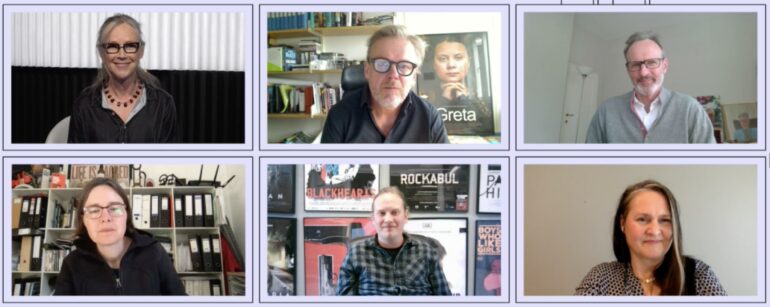WRITTEN BY: Annika Pham
Faster decision-making and earlier support from public funders was one of the ideas put forward to improve the EU audiovisual eco-system challenged by the global platforms.
Tuesday’s webinar “From Pre-Pandemic flashback to post-pandemic visions of documentary distribution” was held as part of CPH:DOX’s CPH:CONFERENCE and Nordisk Film & TV Fond’s third industry meet up Audiovisual Collaboration 2021. Scroll down to watch the recorded session.
Panellists included Signe Byrge Sørensen, CEO and producer at Final Cut for Real, Denmark, Christian Falch, producer at UpNorth Film, Norway, Ulla Simonen, director at AVEK, Finland, Axel Arnö, Commissioning Editor, SVT, Sweden, Head of EBU Documentary Group, and Martin Dawson, Deputy Head of Unit, Creative Europe MEDIA, Belgium.
Giving a concrete example of the pandemic’s impact on distribution, Christian Falch cited Tonje Hessen Schei’s film iHuman
which was promptly shifted from theatrical to VOD when lockdown was announced by the Norwegian government. “Euforia Film did an amazing job and spoke immediately to all local platforms who took the film and turned it into a big success money-wise,” said Falch.
However, for him, the film would probably not have attracted as big an audience if the theatrical distributor hadn’t already lined up a strong media campaign that created awareness and want to see on VOD as well. “The media doesn’t care as much about online premieres as for theatrical releases. It’s not enough to have a film available online. More efforts are needed to make people understand it’s there,” said the producer adding that a recent research across his catalogue showed that VOD is still a loss-leader.
Asked by moderator Karolina Lidin (Senior Documentary Advisor at the Fund) if she felt the traditional business model in Europe has become obsolete in the streaming era, two-fold Oscar nominated Signe Byrge Sørensen said: “It’s important for us in Europe to be aware that we have a valuable public service model, that we have to take care of. We have public broadcasters, national, regional funds, the Media Programme; all this through taxes, so the redistribution of wealth allows us to have cultural policies and to tell important stories for our country, national audience and global audiences as well. “
That said,” continues Sørensen, “it doesn’t mean there isn’t room for improvement, and there are certainly adjustments to be made.”
The other panellists concurred with her. “We should encourage funders and creators to find a brave new world where we haven’t walked before,” suggested Ulla Simonen who feels the disruption on the market is giving power back to creators.
Martin Dawson stressed the high-achieving European documentaries at international awards and festivals, and their essential role “to help us understand what is happening and might happen in our world.” He also urged the European industry “not to rest on its laurels”, as competition is fierce on the global market.
While stressing the welcome “influx of dollars from global streamers”, driving content in Europe, Axel Arnö said SVT cannot compete financially but can instead focus on its public service remit, which is to give the local audience both “what they need and what they don’t know they need.”
Looking at possible ways to protect the European independent sector, he said “nurturing talent is key to our survival. We need to support the talents we have, and make sure they want to work with us.”
Arnö also said the old financing and distribution model is still valid, but needs to be fine-tuned. “We - film institutes, producers, broadcasters - have to find better ways to work together,” he said, suggesting as possible measures, faster decision-making to greenlight the projects and additional funding at development stage.
Sørensen who has five films competing at CPH:DOX - plus a co-production, welcomed both Arnö’s suggestions. She explained that her high-quality documentaries are mostly European or international, not Danish, and therefore rely on pre-sales and co-production for financing, which “can take forever”, and strict rules from some funders make it difficult to apply for support. She said support at development stage, and faster decision-making from broadcasters would definitely ease the production process.
“The challenge for us producers is that everyone wants to take decisions late, which puts pressure on our liquidity,” said Falch, who also welcomed the possibility of receiving extra support during development.
Audiovisual Collaboration 2021, the bridge-building initiative between industry representatives and decision-makers is organised by Nordisk Film & TV Fond and the Finnish Ministry of Education and Culture, under its Presidency of the Nordic Council of Ministers.
The virtual session during CPH:DOX’s CPH:CONFERENCE was an opportunity for the Fund to launch its latest report “Distribution of Nordic Documentaries Supported by Nordisk Film & TV Fond, that premiered between 2015-2018”, which provides a pre-pandemic overview of the documentary market in the Nordics. (See story and access to Report: CLICK HERE).
The next Audiovisual Collaboration 2021 session will be held in August during Haugesund’s Norwegian International Film Festival.
Watch the recorded session from CPH:DOX’s CPH:CONFERENCE here:
